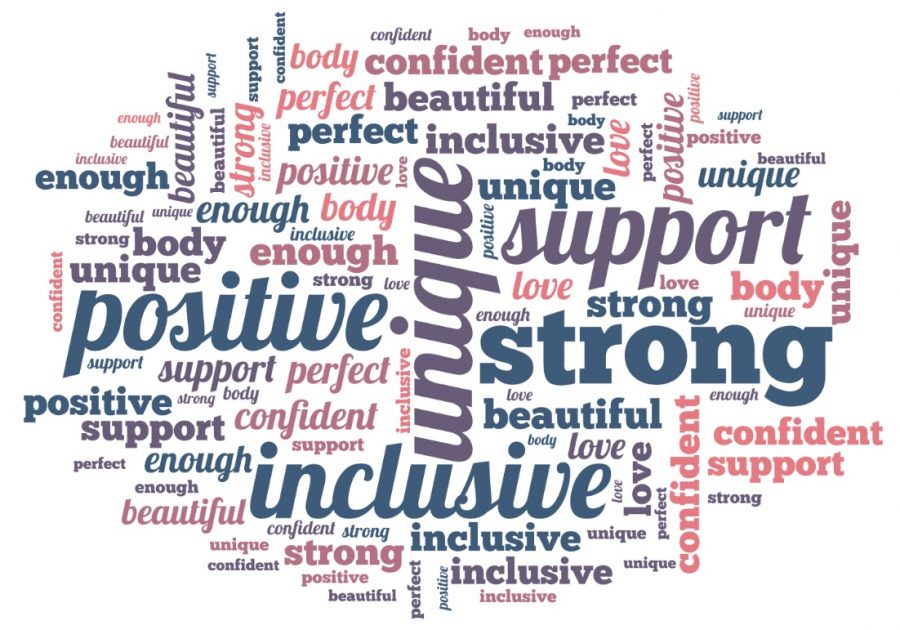The use of Photoshop creates impossible beauty standards
Graphic courtesy of Ava Freeman
These words are representative of the body positive movement. They promote self love and feeling confident in your own skin.
April 22, 2021
“Beauty comes in all shapes and sizes” is the motto for the body positivity movement that took off on TikTok this year. More and more influencers have aimed to showcase their imperfections and emphasize the importance of being confident in your own skin. However, despite there being progress in the world of social media, there is still a lot of work to be done.
Earlier this month a photo of Khloe Kardashian was mistakenly released—it was an untouched, unedited photo of the famous sister in a cheetah print bikini. The image spread quickly and was reposted on various social media outlets, which led to it eventually being deleted altogether by the Kardashian legal team. Following the scandal, Khloe received backlash for not embracing her natural figure and setting a bad example for her audience. But who could blame her for wanting the photo taken down due to the constant criticism celebrities and influencers experience for their looks?
It’s disappointing to say the least that celebrities feel that they can’t show their true self to their fans, as over-retouching photos is harmful and creates impossible beauty standards. Both female and male influencers are expected to reach an unattainable level of beauty in order to be admired by their fans. Since achieving these standards is a near-impossible feat, they resort to Photoshop, Facetune and other retouching apps. This example set by celebrities then results in their fans feeling unworthy and not beautiful enough since they cannot mirror who they look up to.
While individuals are not responsible for another person’s insecurities, the societal pressure to look a certain way is. People feel the need to go to extreme lengths to look like models, influencers or other celebrities who don’t even look the way that they appear in photos themselves.
CNN weighed in on this matter and talked about how the Kardashian incident is a reflection of a much larger problem we have in today’s society.
“The great lengths Kardashian will go to maintain her carefully curated image and the great lengths the public will go to expose her are two symptoms of the same wider issue: how relentless and pervasive the policing of women’s bodies really is,” the CNN article written by Leah Dolan stated.
This could not be any more true, as Khloe’s decision to get the photo removed was due to the pressure she felt to adhere to what other people think she should look like. Photoshopping and over-retouching photos promotes this harmful concept as it gives social media users an inaccurate image that they feel that they have to live up to. If everyone was transparent from the start and Photoshopping Instagram/social media posts never gained popularity, would we still have all the insecurities we have today?
In an ideal world, everyone would be confident in their natural selves and support others who do the same, but unfortunately, this is not the case, which is why many people choose to edit their photos. While it is one thing to edit out a blemish or to fix the lighting in a photo, completely altering one’s body to look like a different person is another. And as soon as one person starts to do this, others feel they must do the same to “look” their best and to keep up with unattainable beauty standards.
On Apr. 7, Khloe posted a response to the backlash on her Instagram account. She first posted a few photos to “prove” that her body looks the same as it does on her social media accounts and then posted a long message about the constant judgment she faces due to her very public life. She even goes on to talk about some of the hurtful remarks that have been made about her over the years.
“‘Khloe is the fat sister.’ ‘Khloe is the ugly sister.’ ‘Her dad must not be her real dad because she looks so different,’” Khloe said when rephrasing the harmful comments she heard growing up.
Despite all the progress that has been made to make our world more inclusive of all body types, there is still a constant underlying pressure to live up to society’s standard of beauty. With our celebrity and fitness role models using Photoshop and other retouching apps, it is almost impossible to decipher what is real and what is fake. Hopefully, we will continue this upward trend of body positivity, and social media will become a place that encourages self-love where Photoshop and Facetune will no longer be necessary.


